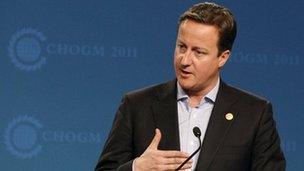Uganda fury at David Cameron aid threat over gay rights
- Published

Human rights should be respected, David Cameron says
The UK is showing a "bullying mentality" by threatening to cut aid to countries where homosexuality is illegal, a Ugandan official says.
UK Prime Minister David Cameron said at the weekend that those receiving British aid should respect gay rights.
But Ugandan presidential adviser John Nagenda told the BBC Ugandans were "tired of these lectures" and should not be treated like "children".
Homosexual acts are illegal in Uganda and most other African countries.
Many people see it as violating religious and cultural beliefs.
In Nigeria, the government has unveiled a draft law which makes it an offence for anyone to support gay marriages.
Mr Cameron told the BBC he had raised the issue of gay rights at the Commonwealth Heads of Government Meeting, in Perth, Australia, last week.
'Natural death'
Mr Cameron said those receiving UK aid should "adhere to proper human rights".
Ending the bans on homosexuality was one of the recommendations of an internal report into the future relevance of the Commonwealth.
Mr Nagenda accused Mr Cameron of showing an "ex-colonial mentality" and of treating Ugandans "like children".
"Uganda is, if you remember, a sovereign state and we are tired of being given these lectures by people," he told the BBC's Newshour programme.
"If they must take their money, so be it."
Mr Cameron's threat applies only to one type of bilateral aid known as general budget support, and would not reduce the overall amount of aid to any one country.
Malawi has already had some of its budget support suspended over concerns about its attitude to gay rights.
Mr Nagenda said the UK's "bullying mentality" was "very wrong".
"Those who have more should give to those who have less. It's as simple as that," he said.
Mr Nagenda said he doubted that the Ugandan parliament would ever approve a bill which proposed the death penalty for some homosexual acts.
"I believe it will die a natural death. But this kind of ex-colonial mentality of saying: 'You do this or I withdraw my aid' will definitely make people extremely uncomfortable with being treated like children," Mr Nagenda said.
The bill - tabled by MP David Bahati - sparked widespread international condemnation earlier this year.
Meanwhile, a Senate committee in Nigeria is holding public hearings into a proposed new law on same sex marriages.
Homosexual acts and gay marriages are already illegal in Nigeria but the draft law would also punish those who aid or abet such marriages, reports say.
Mr Cameron said he had spoken with "a number of African countries" and that more pressure had been applied by Foreign Secretary William Hague, who deputised for him during parts of the Commonwealth summit.
Some 41 nations within the 54-member Commonwealth have laws banning homosexual acts. Many of these laws are a legacy of British rule.
- Published29 October 2011
- Published13 May 2011
- Published30 June 2011